328 Search Results for communication boards
September 2, 2012
by Robin Parker -
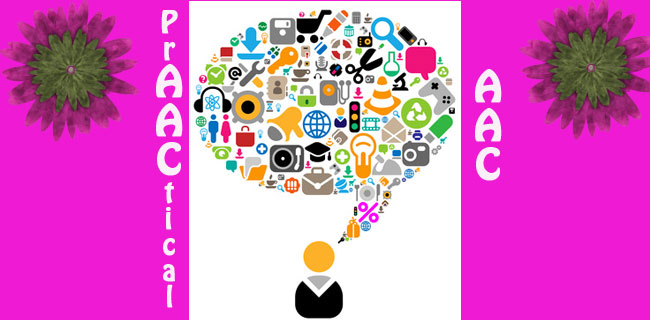
We have recently been surprised (ok, shocked) by the absence of communication supports in educational settings that are supposed to be supporting learners with significant communication challenges. To be even more specific and blunt, the students do not have functional spoken speech. They can’t speak to let you know: what they need, what they don’t need or want, how they feel, what they see, what interests them, what questions they have, what they like and don’t like, when they really reallywant something, etc., etc. etc. And, trust us, they do need to say all of these things. If you work with anyone who does not use spoken speech and we mean ANYONE, they deserve the basic right to communicate with you. Our PrAACtical AAC Absolute A’s: AAC displays need to be accessible ALLOVER. There is no special ‘communication time.’ Communication teaching is ALL the time in authentic situations.... [Read More...]
July 29, 2012
by Carole Zangari -
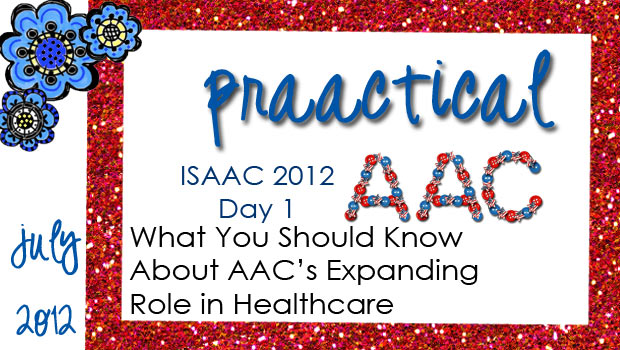
Welcome to ISAAC, 2012! — It’s the first day of the ISAAC pre-conference and the focus of the workshop I attended was on healthcare. It was quite an honor to learn from such a stellar group of AAC professionals, including Sarah Blackstone, John Costello, Kathryn Garrett, Richard Hurtig from the US and Cristina Cerantola, Elisabeth Cataix Negre, several others from around the world, who came together to talk about effective patient-provider communication. As we well know, the AAC community is one of several communication vulnerable populations that require special supports when accessing health care. This presentation was highly interactive and covered best practices, strategies, and technologies that we should be putting into place for people with AAC needs as they interact with medical personnel. – There was a wealth of resources shared during the workshop, mostly of very prAACtical resources. We have permission to share many of them here. Watch... [Read More...]
June 27, 2012
by Carole Zangari -
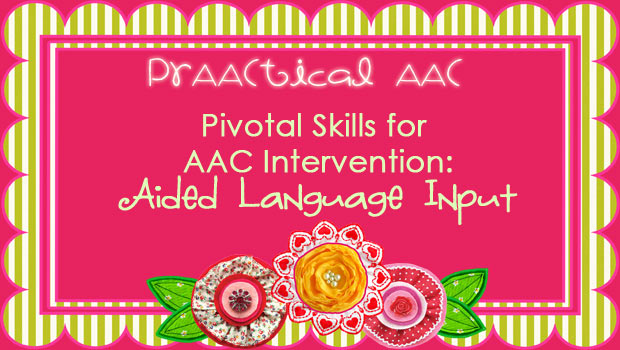
We can’t seem to stop talking about the power of aided language input. It’s one of those strategies that make our sessions more effective and make our clinicians more comfortable with the learner’s AAC system. And when other team members see us using it, they can’t help but pick up on the importance of aided modeling for people who are still learning to use their communication boards, books, SGDs, and mobile devices. – Modeling, AAC Style (clinical rationale, research supports) AACtual Progress: Learning to use Aided Language Input (lessons learned) Strategy of the Month: Aided Language Input (screencast overview) Using the Device/App: Getting the Team on Board (implementation) Teachers in AACtion: Aided Language Input (video) Why We Love Aided Language Input (clinical rationale) Curated Resources for Aided Language Input (miscellaneous info, videos) Video of the Week: Aided Language Input Demo (video) 5 Tools to Make Aided Language Input Easier –
June 22, 2012
by Carole Zangari -
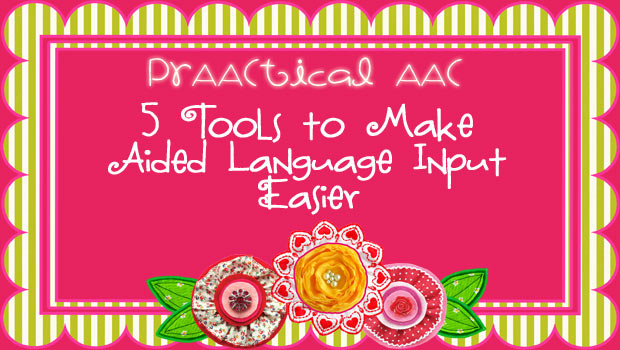
If you’ve been following our blog, you know that we consider aided language input to be a pivotal skill for any SLP working with a client who uses AAC. You can read more about aided language input on our earlier posts, but the shorthand version is this… – People learning AAC need to see/hear competent models of their AAC system frequently. As a clinician, you have to ‘speak AAC’ by using their communication tools or a reasonable facsimile. – The more WE use the communication boards, books, SGDs, and apps, the more the learner will, too. Sometimes, your finger is all you need. But what if you have a poster-sized wall mounted AAC display that you are using to ‘talk’? What if the AAC learner needs some help to notice what you are doing? Here are some tools that can help. – 1. Maglite or Laser Pointer (used with safe... [Read More...]
June 2, 2012
by Carole Zangari -
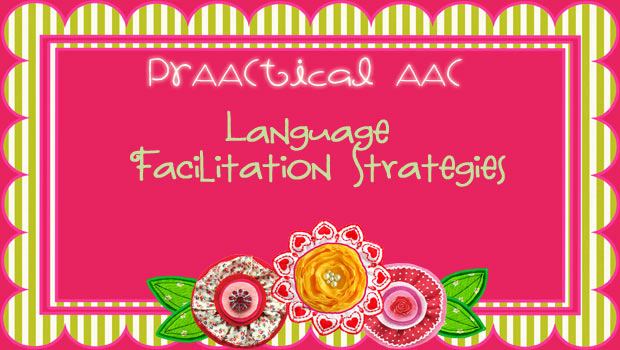
Well, it’s Week 4 of the new semester and, in our AAC classes, we’ve been talking a lot about how language is represented and organized in communication boards/books, SGDs, and AAC apps. We’ve talked about the pro’s and con’s of representing language in various ways, and discussed the options for how to set up displays so that people can easily access the words they need. At this point, we know how to choose appropriate symbols, select appropriate vocabulary, and arrange it in an appropriate format. In short, we know how to put language ‘in.’ Now comes the hard part: Getting it out. How do we get people to actually use the language that’s been so carefully stored in the no tech, low tech, and high tech AAC tools? Our June Strategy of the Month is about techniques for language facilitation. If you’re an SLP well-versed in language therapy with speaking children,... [Read More...]
May 1, 2012
by Carole Zangari -
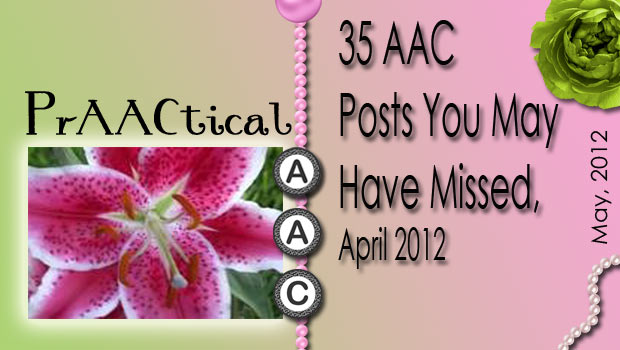
— – – Strategy of the Month From Disney Princesses to Houseplants: More on Building Communication Opportunities 5 Apps for Tempting Commenting and Other Language Functions Go Ape! 10 Commenting Communication Temptations PrAACtical Play: Creating Communication Opportunities with Favorite Toys How to Make Communication Temptations Really Work Mining Preschool Routines for PrAACtical AAC Opportunities. Meaningful Communication Opportunities – The Fives 5 ‘Go-To’ Sites for AAC and Visual Support Downloads 5 Apps for Tempting Commenting and Other Language Functions 5 AAC-Related Facebook Pages/Groups We Love 5 Tools and Tips for Making Transitions Easier 5+ Sites for Free AAC-Friendly Literacy Resources 5 eGames for Switch Users 5 AAC/AT YouTube Channels We Love – PrAACtical Thinking 49 Free or Lite Versions of AAC Apps A Myth About Visual Schedules Lives On PrAACtical Resources: Making Decisions about Reading Accessibility Options PrAACtical Resources: Toolkit for ASD PrAACtical Questions: How Do I Find Good AAC Service... [Read More...]
February 10, 2012
by Robin Parker -
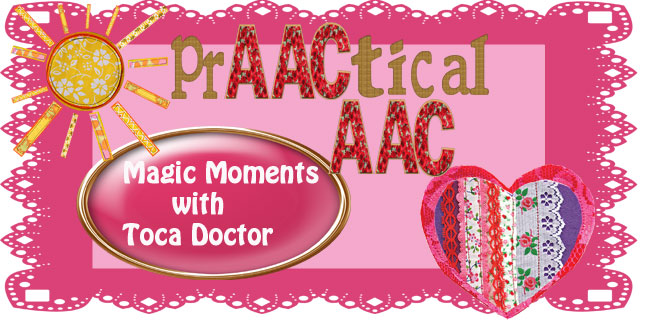
Magic Moments: AAC Intervention with Apps You Love- Toca Boca Doctor “An apple a day keeps the doctor away”… If it were only that simple. But it is not that easy and since we are right in the middle of cold and flu season, it reminds us about teaching AAC users to let us know when they are not feeling well. The more we can find ways to make the concepts of pain, injury, and distress more concrete and specific, the easier it is to learn. Telling others about your own discomfort is an important self-advocacy and self-determination skill. —- On a more PrAACtical note, telling about your symptoms... [Read More...]
January 23, 2012
by Robin Parker -

AAC & The Art of the Unconventional Conversation, Carole’s post from Saturday, recounts a young girl who some people might have thought was not ready for AAC. It reminds me a young man I know, Michael. I met Michael when he was 14, after he was discharged from all of his communication intervention or I should say his speech-language therapy sessions. He was discharged at school because when he moved from his autism classroom in middle school to a high school classroom for children with varying exceptionalities, it was ‘felt’ that he did not need it anymore. He had not made ‘progress’ in his speech and language goals, he did not talk, he did not consistently identify objects, and he did not essentially do a lot of things. He was discharged from his private therapy as he was not making progress in a lot of goals there either. Everyone... [Read More...]
January 20, 2012
by Carole Zangari -
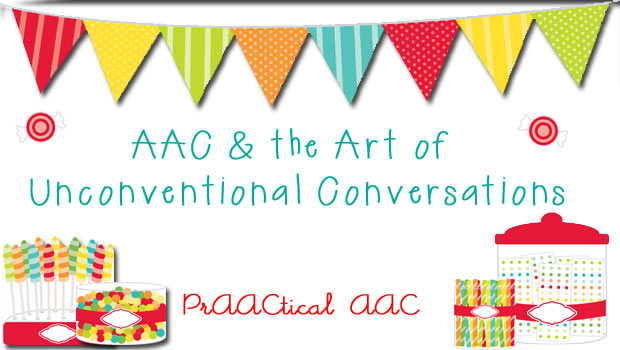
There’s an art to having a conversation with someone who has significant communication challenges. One of my favorite experiences with this dates back to the 1980’s, when I was working with a preschooler who had Rett Syndrome. Julia was a beautiful little girl who lived with her (very young) mom and her grandma. Grandma watched Julia while mom was in school, and I spent a good amount of time visiting them in their modest home (a trailer) trying to earn their trust and figure out how to help Julia communicate better in school. – At home, as it turns out, she was communicating just fine, at least for the very basic things. A typical conversation between Julia and her grandma went like this. Julia paces around the coffee table, wringing her hands, rocking a bit, and staring at the carpet. She pauses in front of the TV and Grandma says... [Read More...]
January 8, 2012
by Carole Zangari -
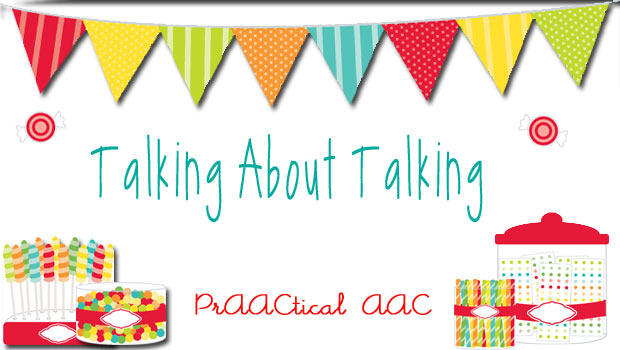
A colleague and I taught a workshop awhile back where there was an interesting sidebar conversation. A special educator was trying to convince an administrator that even though her student used a high tech speech generating device (SGD), she still needed the software to create other communication tools, like language boards and visual schedules. Having spent a great deal of money on AAC technology, the administrator was reluctant to commit additional funds for that authoring software. “She has a $5,000 device,” Sally Supervisor said. “Now you’re telling me you need special software to make things you can print out on paper?”The teacher’s point, of course, was a valid one. Children with AAC needs, like the rest of us, communicate in a variety of ways. In most cases, they need access to a variety of tools and the training to use them effectively. Just like we do.We gesture. We write with... [Read More...]









